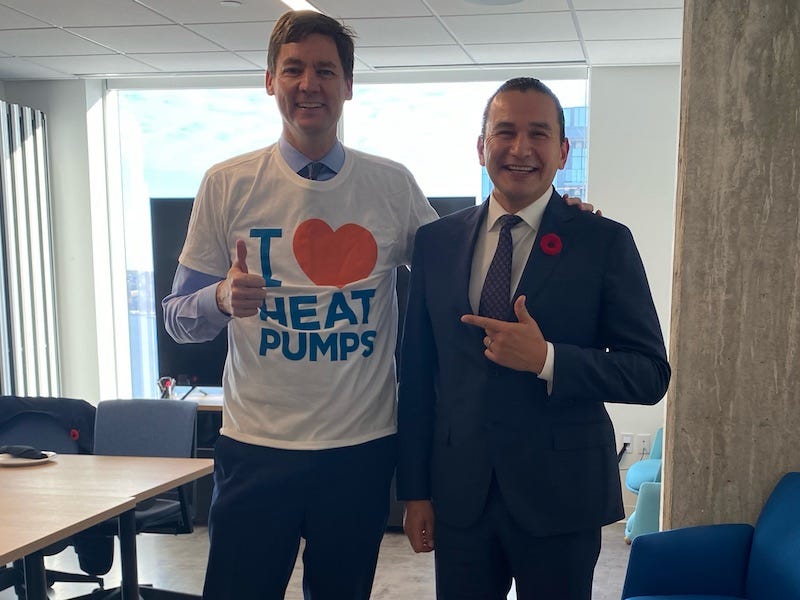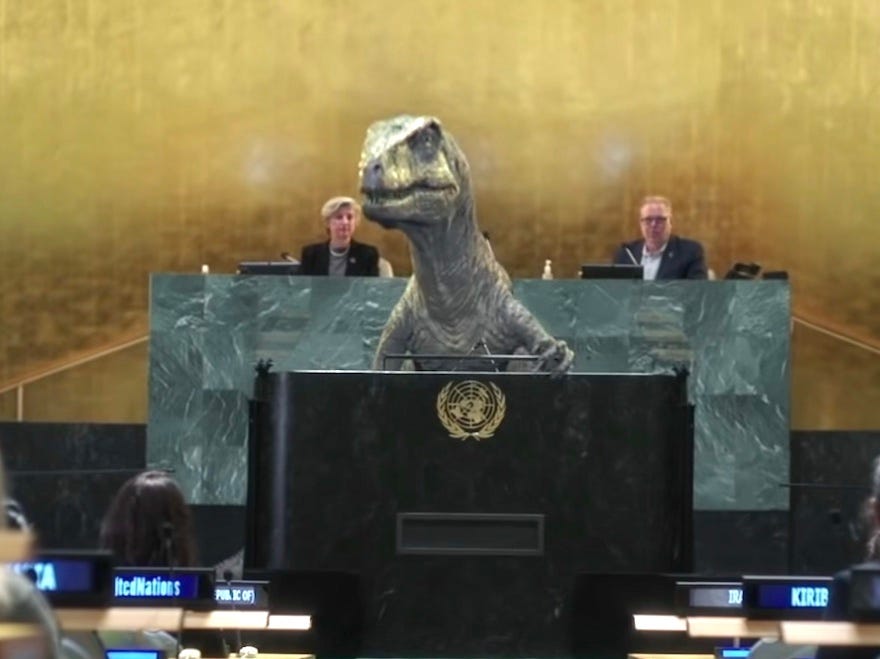Affordable Energy is the Winning Argument to Keep Federal Climate Policy Intact
When a provincial premier shows up at an intergovernmental meeting in an “I ❤️ Heat Pumps” t-shirt, you know you’re witnessing a shift in energy and climate politics. Here’s what has to happen next.

“What the heck is going on with carbon pricing, and why are we all talking about heat pumps all of a sudden?”
The lead-off question from session moderator Catherine Abreu was a pitch-perfect starting point for a panel discussion with Environment Minister Steven Guilbeault and Natural Resources Minister Jonathan Wilkinson during the Canadian Climate Institute’s annual conference last Thursday.
Even though neither of them showed up in a stylish and insightful “I ❤️ Heat Pumps” t-shirt, the way British Columbia Premier David Eby did at a recent provincial/territorial leaders’ meeting.
The Climate Institute conference convened against a backdrop of federal and some provincial politicians gearing up to fight another climate change election when Canadians next go to the polls. The question from Abreu, executive director of Destination Zero and a member of Canada’s Net-Zero Advisory Body, may have pointed to the best opportunity to keep federal climate policy intact after all the votes have been counted.
There was some obvious smart thinking behind the decision to attach a heat pump incentive to Prime Minister Justin Trudeau’s October 26 announcement of a three-year carbon price exemption for home heating oil. I’m not sure anyone expected that move to bring energy efficiency and heat pumps to the centre of the country’s hyper-politicized, needlessly partisan and toxic debate over climate policy.
But what if it had that effect all the same?
What if Trudeau’s awkward climbdown on his government’s signature climate policy was exactly what the country needed to focus attention on the massive potential to rapidly phase out oil and gas heating, once and for all? To give Canadian households a big, permanent break on their home energy bills, and quickly drive down climate pollution along the way?
And what if the end result is that no party of any political stripe can hope to win the next election without showing that it’s serious about putting those cost savings in Canadians’ hands, day after day and year after year, rather than refighting the battle over carbon pricing while refusing to commit to even the most basic climate targets?
Programming note: You’ve no doubt been reading that tech giants Google and Facebook/Meta are blocking Canadian media from their news platforms. That makes email subscriptions to The Energy Mix and the Energy Mix Weekender your best antidote to make sure you always get the climate news you need. Subscribe today and never miss another edition!
A Groundswell for Heat Pumps
Deliberately or not, Trudeau’s announcement tapped into a level of latent public interest in heat pumps that is quickly growing into a groundswell. (A groundswell for ground source? Nah, couldn’t be. But then again, that t-shirt…)
It was starting to build just before the pandemic, when a heating and cooling distributor in Atlantic Canada told me the devices were flying off the shelves. But the real surge is more recent. A year ago, Steve Winkelman, executive director of the Ottawa Climate Action Fund (OCAF), was still calling heat pumps “the most unsexy but essential technology that most people have never heard of.” Since then, things have changed.
We’ve seen it in our own reader data. Every time we publish a heat pump story that we think is simple and straightforward, it picks up far more page views than we expect, often leading our statistics for the week. It’s easy enough to look at cheap political ploys like Alberta Premier Danielle Smith’s ludicrous “freezing in the dark” campaign, or her government’s wholly unjustified seven-month moratorium on renewable energy development, and assume they speak for public sentiment.
Until people out here in the real world get to vote with their feet, or in this case, with their scarce reading time. And then they do.
The Story So Far…
IEA Heat Pump Report Signals Bigger Shift on Road to Net-Zero
Canadians Could Save $10.4B, Cut Climate Pollution by Replacing Central Air with Heat Pumps
Heat Pumps Cut Costs, Decarbonize Buildings, Even on Coldest Days
95% LOWER EMISSIONS: Sweden’s Shift to Heat Pumps Holds Lessons for Canada
‘Yes, We Love Our Heat Pump’: Fossil-Free Household Cancels Contract with Gas Company
‘First, You Create a Crisis’
But a boom in interest isn’t the same thing as a boom in installations. It’s just the first, essential step in that direction. The leap from what we want to do to how we get it done is always the biggest hurdle for any climate solution.
And on that front, Trudeau’s announcement delivered. Conditionally. Not yet for everyone, as Efficiency Canada’s Brendan Haley and the Institute for Research on Public Policy’s Rachel Samson pointed out. But it jump-started a long-overdue conversation.
As the CBC’s Aaron Wherry writes, “whatever else the Liberal government's carbon tax contortions have done, they may have boosted the cause of energy efficiency—particularly for those low-income households who most need the help.” Those households stand to save an average $2,500 per year once their heat pumps are in place.
Maybe it’s time for Trudeau to take the next step and deliver some variant on the speech he never gave.
But even now, it’s worth comparing and contrasting the PM’s announcement with a moment nearly 30 years, when newly-appointed Ontario education minister John Snobelen declared his strategy for school finance. “First, you create a crisis,” he said, then proceeded to loot a billion dollars (in 1995-96 dollars, mind) from struggling classrooms across the province.
The two policy announcements were polar opposites. But they both triggered political crises that grabbed public attention, Trudeau’s for better and Snobelen’s for worse.
Trudeau got a provincial premier wearing a heat pump t-shirt and multiple analysts making the case for an end-to-end approach to energy efficiency and building retrofits, with a plan that brings some relief to low- and moderate-income households and helps build stronger communities. Which means the government’s next step can and should be to seize the moment and extend the heat pump incentive to all regions and fuel types.
Snobelen got a reaction that eventually helped topple the Mike Harris/Ernie Eves government in Ontario, as hundreds of angry, desperately determined households mobilized to protect the school system on which our children’s future depended. “Sometimes there are times when you have to go to war,” one colleague in that fight told me, before declaring for a school trustee position he didn’t want, because no one else was stepping up in an election we desperately needed to win.
It’s still early days, but that’s the level of positive grassroot response we need for energy efficiency and heat pumps (and so much more).
From Peril to Opportunity
The difference between the two announcements is blindingly obvious. Snobelen was proudly ripping away at the very fabric of the society by undercutting desperately-needed school and community services. Trudeau’s announcement, taken to its best possible conclusion, could put an end to anyone ever having to choose between food and fuel. (Even in cold climates.)
But only if a period of political peril morphs into a moment of cross-partisan community opportunity.
With the next federal election less than two years away and Trudeau sinking fast in public opinion polls, you can confidently predict that the upcoming vote will be the subtext for everything you see and hear from Ottawa until the campaign is done. Until now, for all the loud rhetoric about constitutional authorities and provincial jurisdiction, what we haven’t heard is a coherent call for practical, tangible energy solutions that will help tackle the affordability crisis and make life better.
But suddenly, the case is being made. Guilbeault pointed out during last week’s panel discussion that the cost of heating oil has increased “substantially faster” than other fuels and was already higher to begin with. His predecessor, Catherine McKenna, connected those high costs back to record fossil fuel profits, which explains why oil heating costs are still high in spite of the federal price break.
All of that was after the Bank of Canada’s independent governor, Tiff Macklem, said the carbon price contributed less than one-sixth of a percentage point to inflation—before factoring in quarterly rebates that put most households ahead.
So the dots have been connected. Now, all of the federal party leaders and their advisors need to get the memo if they haven’t already. That the government is on the right track with the heat pump announcement, but this is not the time for half measures. That Canadians are looking for substance, not spin on affordability, energy, and climate, and for real gains, not endless political wrangling. That more voters will start to suspect that someone is listening, that politicians actually get it, when they see practical programs that bring costs down and give them some breathing room in their month-to-month budgeting.
And if those programs cut emissions, too…well, in our line of work, that’s what we like to call a “co-benefit” [pdf]. Even if most people outside the climate “bubble” would say we’re getting the benefits and co-benefits backwards.
Like any of us, the federal parties will speed up their climate commitments when they can see themselves in the picture. When they figure out they won’t get the votes they want unless the rest of us get the results we need.
But they’d better get on with it, all of them. Because their political prospects and our climate future depend on it.
Mitchell Beer traces his background in renewable energy and energy efficiency back to 1977, in climate change to 1997. Now he and the rest of the Energy Mix team scan 1,200 news headlines a week to pull together The Energy Mix, The Energy Mix Weekender, and our two weekly e-digests, Cities & Communities and Heat & Power.
You can also bookmark our website for the latest news throughout the week.
Video of the Week

Blame Fossil Profits, Not Carbon Tax, for ‘Skyrocketing’ Prices: McKenna
Regulator Pauses Suncor Plan to Extract 1B Barrels from Alberta Wetland
Global Fossil Production Set to Blow Through 1.5°C Climate Limit, New Report Warns
EV Battery Prices to Fall 40% by 2025, Goldman Sachs Predicts
Energy Analysts Offer Fixes for Six Capacity Market Flaws
Ottawa Boosts Atlantic Heat Pump Incentive, Suspends Carbon Tax on Home Heating Oil
Senators Probe Pace of Energy Transition as Official Defends Controls on Fossil Emissions
Mixed Reviews for Quebec Net-Zero Plan as Experts Cite Demand Reduction Challenges
Up to $185B in Investment, 8 to 9 GW of New Capacity as Hydro-Québec Unveils 2035 Plan
Natural gas is a dying commodity, and Canada needs to stop supporting it (Globe and Mail)
The carbon price is now off home heating oil — but the cost of oil is still high (The Canadian Press)
Energy Efficiency: It’s Time To Get Next Level (Forbes)
Out of sight, out of mind: let’s make energy efficiency visible in the energy mix (Euractiv)
Accent on Agriculture – Farmers feel impact of climate change (The Carillon/Winnipeg Free Press)
Pembina Pipeline needs Trans Mountain ‘certainty’ before considering an offer, says CEO (The Canadian Press)
TC Energy says it will focus on smaller projects now that Coastal GasLink is complete (Reuters)
Greenpeace calls for Canadian forestry giant to lose its eco certification (Canadian Broadcasting Corporation)
Direct Air Capture: Big Oil’s Latest Smokescreen (Center for International Environmental Law)
Climate Change Is Causing Severe Drought in a Volatile Mideast Zone, Study Finds (New York Times)
Texas could spend federal funds meant to cut carbon emissions on highway projects (Texas Tribune)
Canada’s ‘Climate Barbie’: How Catherine McKenna moved from insult to owning it (The Weather Network)






